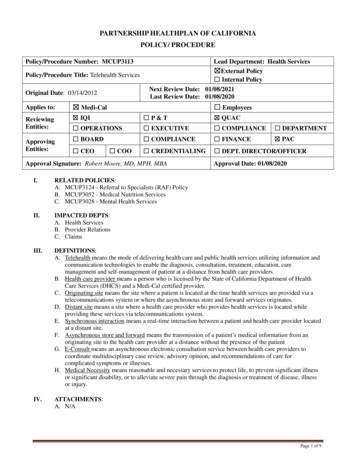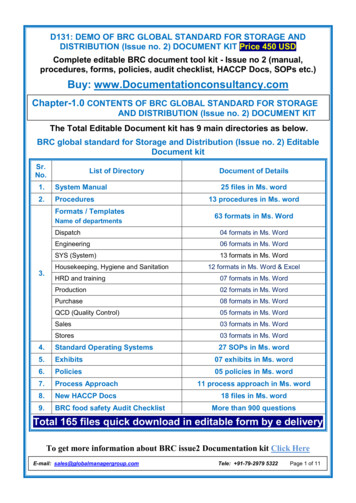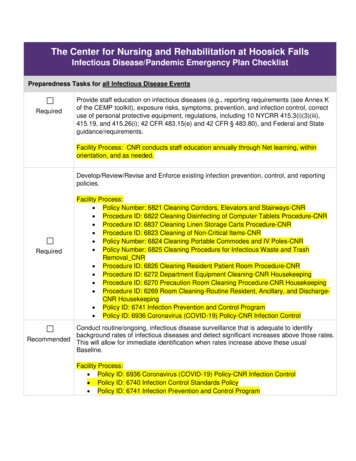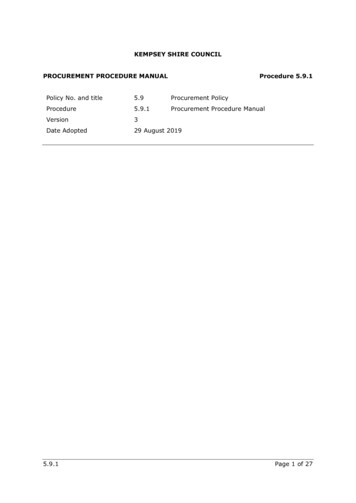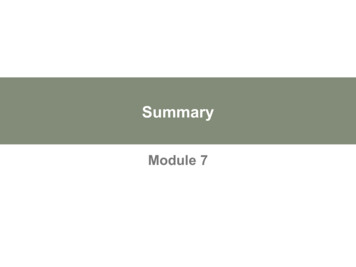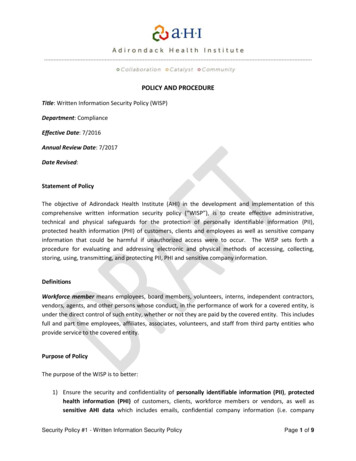
Transcription
POLICY AND PROCEDURETitle: Written Information Security Policy (WISP)Department: ComplianceEffective Date: 7/2016Annual Review Date: 7/2017Date Revised:Statement of PolicyThe objective of Adirondack Health Institute (AHI) in the development and implementation of thiscomprehensive written information security policy (“WISP”), is to create effective administrative,technical and physical safeguards for the protection of personally identifiable information (PII),protected health information (PHI) of customers, clients and employees as well as sensitive companyinformation that could be harmful if unauthorized access were to occur. The WISP sets forth aprocedure for evaluating and addressing electronic and physical methods of accessing, collecting,storing, using, transmitting, and protecting PII, PHI and sensitive company information.DefinitionsWorkforce member means employees, board members, volunteers, interns, independent contractors,vendors, agents, and other persons whose conduct, in the performance of work for a covered entity, isunder the direct control of such entity, whether or not they are paid by the covered entity. This includesfull and part time employees, affiliates, associates, volunteers, and staff from third party entities whoprovide service to the covered entity.Purpose of PolicyThe purpose of the WISP is to better:1) Ensure the security and confidentiality of personally identifiable information (PII), protectedhealth information (PHI) of customers, clients, workforce members or vendors, as well assensitive AHI data which includes emails, confidential company information (i.e. companySecurity Policy #1 - Written Information Security PolicyPage 1 of 9
POLICY AND PROCEDUREexpansion plans, manufacturing processes, business processes, highly secretive information,etc.), workforce member information and the like.;2) Protect against any reasonably anticipated threats or hazards to the security or integrity of suchinformation; and3) Protect against unauthorized access to or use of such information in a manner that creates asubstantial risk of identity theft, fraud or harm to AHI.Scope of PolicyIn formulating and implementing the WISP, AHI has addressed and incorporated the following protocols:1) Identified reasonably foreseeable internal and external risks to the security, confidentiality,and/or integrity of any electronic, paper or other records containing PII, PHI and sensitivecompany data.2) Assessed the likelihood and potential damage of these threats, taking into consideration thesensitivity of the PII, PHI and sensitive company data.3) Evaluated the sufficiency of existing policies, procedures, customer information systems, andother safeguards in place to control risk.4) Designed and implemented a WISP that puts safeguards in place to minimize identified risks.5) Implemented regular monitoring of the effectiveness of those safeguards.Security SafeguardsThe following safeguards are effective immediately. The goal of implementing these safeguards is toprotect against risks to the security, confidentiality, and/or integrity of any electronic, paper or otherrecords containing PII, PHI or sensitive company data.Security Policy #1 - Written Information Security PolicyPage 2 of 9
POLICY AND PROCEDUREAdministrative Safeguards1) Security Officer - AHI has designated Lottie Jameson to implement, supervise and maintainthe WISP. This designated employee (the “Security Officer”) will be responsible for thefollowing:(a) Implementation of the WISP including all provisions outlined in Security Safeguards.(b) Training of all employees that may have access to PII, PHI and sensitive companydata. Employees should receive annual training and new employees should betrained as part of the new employee hire process.(c) Regular monitoring of the WISP’s safeguards and ensuring that employees arecomplying with the appropriate safeguards.(d) Evaluating the ability of any Third Party Service Providers to implement andmaintain appropriate security measures for the PII, PHI and sensitive company datato which AHI has permitted access, and requiring Third Party Service Providers, bycontract, to implement and maintain appropriate security measures.(e) Reviewing all security measures at least annually, or whenever there is a materialchange in AHI’s business practices that may put PII, PHI and sensitive company dataat risk.(f) Investigating, reviewing and responding to all security incidents or suspectedsecurity incidents.2) Security Management - All security measures will be reviewed at least annually, orwhenever there is a material change in AHI’s business practices that may put PII, PHI orsensitive company data at risk. This should include performing a security risk assessment,documenting the results and implementing the recommendations of the security riskassessment to better protect PII, PHI and sensitive company data. The Security Officer willbe responsible for this review and will communicate to management the results of thatreview and any recommendations for improved security arising out of that review.Security Policy #1 - Written Information Security PolicyPage 3 of 9
POLICY AND PROCEDURE3) Minimal Data Collection – AHI will only collect PII, PHI of clients, customers or employeesthat is necessary to accomplish legitimate business transactions or to comply with any andall federal, state or local regulations.4) Information Access – Access to records containing PII, PHI and/or sensitive company datashall be limited to those persons whose job functions require a legitimate need to access therecords. Access to the records will only be for a legitimate job-related purpose. In addition,pre-employment screening should take place to protect PII, PHI and sensitive company data.5) Employee Termination - Terminated employees must return all records containing PII, PHIand sensitive company data, in any form, that may be in the former employee’s possession(including all information stored on laptops or other portable devices or media, and in files,records, work papers, etc.). A terminated employee’s physical and electronic access to PII,PHI and sensitive company data must be immediately blocked. A terminated employee shallbe required to surrender all keys, IDs or access codes or badges, business cards, and the like,that permit access to AHI’s premises or information. A terminated employee’s remoteelectronic access to PII, PHI and sensitive company data must be disabled; his/her voicemailaccess, e-mail access, internet access, and passwords must be invalidated. See SecurityPolicy #2 – Separation of Employment Policy.6) Security Training – All workforce members that may have access to PII, PHI and sensitivecompany data, will receive security training. Employees and Board Members should receiveat least annual training and new employees should be trained as part of the new employeehire process. Employees should be required to show their knowledge of the informationand be required to pass an exam that demonstrates their knowledge. Documentation ofemployee training should be kept and reviewed.7) WISP Distribution - A copy of the WISP is to be distributed to each current employee and toeach new employee on the beginning date of their employment. It shall be the employee’sresponsibility for acknowledging in writing or electronically, that he/she has received a copyof the WISP and will abide by its provisions. See Security Policy - Written InformationSecurity Policy (WISP) Appendix A – WISP Employee Acknowledgement Form.8) Contingency Planning – All systems that store PII, PHI and/or sensitive company data shouldhave the data backed up on, at least, a nightly basis. Data should be encrypted and beSecurity Policy #1 - Written Information Security PolicyPage 4 of 9
POLICY AND PROCEDUREstored offsite. Disaster Recovery mechanisms and documented procedures should be inplace to restore access to PII, PHI and sensitive company data as well as any operationalsystems that AHI relies on. A system criticality assessment should be performed thatdefines how critical each of AHI’s systems are. Systems that are critical to operations shouldbe restored before non-critical systems. On a periodic basis, data backups, data restorationand Disaster Recovery procedures should be tested and validated.9) Security Incident Procedures - Employees are required to report suspicious or unauthorizeduse of PII, PHI and/or sensitive company data to a supervisor or the Security Officer.Whenever there is an incident that requires notification pursuant to any federal or stateregulations, the Security Officer will conduct a mandatory post-incident review of the eventsand actions taken in order to determine how to alter security practices to better safeguardPII, PHI and sensitive data. See Security Policy - Compliance Reporting and Response.10) Emergency Operations – Procedures are in place to define how AHI will respond toemergencies. Procedures should include employee contact information, critical vendorcontact information, important vendor account information as well as any emergencyoperating procedures. See Emergency Action Plan.11) Data Sensitivity Classification – All data that AHI stores or accesses should be categorized interms of the sensitive nature of the information. For example, PII, PHI and sensitivecompany data might have a very high sensitivity and should be highly protected. Whereaspublicly accessible information might have a low sensitivity and requires minimal protection.12) Third Party Service Providers - Any service provider or individual (“Third Party ServiceProvider”) that receives, stores, maintains, processes, or otherwise is permitted access toany file containing PII, PHI and/or sensitive company data shall be required to protect PII,PHI and sensitive company data. The Third Party Service Providers must sign serviceagreements that contractually hold them responsible for protecting AHI’s data. Examplesinclude third parties who provide off-site backup of electronic data; website hostingcompanies; credit card processing companies; paper record copying or storage providers;data destruction vendors; IT / Technology Support vendors; contractors or vendors workingwith customers and having authorized access to PII, PHI and/or sensitive company data.Security Policy #1 - Written Information Security PolicyPage 5 of 9
POLICY AND PROCEDURE13) Sanctions - All employment and vendor contracts, where applicable, should be amended torequire all workforce members to comply with the provisions of the WISP and to prohibitany nonconforming use of PII, PHI and/or sensitive company data as defined by the WISP.Disciplinary actions will be taken for violations of security provisions of the WISP (The natureof the disciplinary measures may depend on a number of factors including the nature of theviolation and the nature of the PII, PHI and/or sensitive company data affected by theviolation). See Security Policy – Corrective Action Policy.14) Bring Your Own Device (BYOD) Policy – AHI may allow workforce members to utilizepersonally owned devices such as laptops, smartphones and tablets. In the event aworkforce member opts to utilize their personal device rather than an AHI-issued device,proper safeguards must be implemented to protect PII, PHI and sensitive company data thatmay be accessed or stored on these devices. Workforce members must understand whatthe requirements are for using personally owned devices and what safeguards are required.See Security Policy – BYOD Policy.15) Mobile Device Management (MDM) Policy – AHI recognizes that it has a duty to protect itsinformation assets in order to safeguard its clients, employees, intellectual property andreputation. This document outlines a set of practices and requirements for the safe use ofmobile devices and applications. This policy also applies to BYOD. See Security Policy –MDM Policy.Physical Safeguards16) Facility Access Controls – AHI will implement physical safeguards to protect PII, PHI andsensitive company data. There will be physical security on facilities / office buildings toprevent unauthorized access. All systems that access or store PII, PHI and/or sensitivecompany data will be physically locked. Workforce members will be required to maintain a“clean desk” and ensure that PII, PHI and/or sensitive company data is properly securedwhen they are not at their desk. The Security Officer will maintain a list of lockcombinations, passcodes, keys, etc. and which employees that have access to the facilitiesand PII, PHI and/or sensitive data. Visitors will be restricted from areas that contain PII, PHIand/or sensitive company data. See Security Policy - Facility Security.Security Policy #1 - Written Information Security PolicyPage 6 of 9
POLICY AND PROCEDURE17) Network Security – AHI will implement security safeguards to protect PII, PHI and sensitivecompany data. Safeguards include; isolating systems that access or store PII, PHI and/orsensitive company data, the use of encryption on all portable devices, physical protection onportable devices, ensuring that all systems run up-to-date anti-malware, implementingnetwork firewalls, performing periodic vulnerability scans, capturing and retaining networklog files as well as ensuring that servers and critical network equipment are stored in anenvironmentally safe location. See Security Policy – Network Security.Technical Safeguards18) Access Control - Access to PII, PHI and sensitive company data shall be restricted toapproved active users and active user accounts only. Employees will be assigned uniqueuser accounts and passwords. Systems containing PII, PHI and sensitive company datashould have automatic logoff procedures to prevent unauthorized access. See SecurityPolicy – Access Control19) Computer Use – All applicable workforce members will be given an ElectronicCommunications, Media, Internet & Cell Phone Usage Policy that defines acceptable andunacceptable use of AHI’s computing resources. Every supervisor/manager, on at least anannual basis, shall share this policy with each of his/her employees who use ElectronicCommunications to reinforce the appropriate usage of AHI electronic Communications on aregular basis. See Security Policy – Electronic Communications, Media, Internet & CellPhone Usage20) Data Disposal - Written and electronic records containing PII, PHI and sensitive companydata shall be securely destroyed or deleted at the earliest opportunity consistent withbusiness needs or legal retention requirements. See Security Policy – Equipment Disposal21) System Activity Review - All systems that store or access PII, PHI and sensitive companydata should utilize a mechanism to log and store system activity. Periodic system activityreviews should occur and identify unauthorized access to PII, PHI and sensitive companydata. Any unauthorized access should be reported to the Corporate ComplianceCoordinator. See Security Policy - Compliance Reporting and Response.Security Policy #1 - Written Information Security PolicyPage 7 of 9
POLICY AND PROCEDURE22) Encryption - To the extent technically feasible all portable devices that contain PII, PHI andsensitive company data should be encrypted to protect the contents. In addition,encryption should be used when sending any PII, PHI and sensitive company data acrosspublic networks and wireless networks. Public networks include email and Internet access.Policy ComplianceThe Compliance Department will verify compliance to this policy through various methods, including butnot limited to, periodic walk-throughs, business tool reports, internal and external audits, and any othernecessary means of investigation.Anyone found to have violated this policy may be subject to disciplinary action, up to and includingtermination of employment or services. In cases where local, state, or federal laws have been violated,workforce members may also face prosecution.Anyone that witnesses a violation of this policy is required to report the incident at the earliest possiblemoment to either a supervisor or to the Compliance Department. Any incident reported in good-faith isprotected under AHI’s whistleblower policy.Contact Person: Corporate Compliance CoordinatorResponsible Person: Security OfficerApproved By: CEO/Board of DirectorsSecurity Policy #1 - Written Information Security PolicyPage 8 of 9
POLICY AND PROCEDUREAppendix A – WISP Acknowledgement FormI have read, understand, and agree to comply with the Written Information Security Policy (WISP), rules,and conditions governing the security of PII, PHI and sensitive company data. I am aware thatviolations of the WISP may subject me to disciplinary action and may include termination of myemployment or contract with AHI.By signing this Agreement, I agree to comply with its terms and conditions.Agreement is not an excuse for violating it.SignaturePrint NameReviewed ByFailure to read thisDatePosition with AHIDateTitleSecurity Policy #1 - Written Information Security PolicyPage 9 of 9
of the WISP and will abide by its provisions. See Security Policy - Written Information Security Policy (WISP) Appendix A - WISP Employee Acknowledgement Form. 8) Contingency Planning - All systems that store PII, PHI and/or sensitive company data should have the data backed up on, at least, a nightly basis. Data should be encrypted and be





